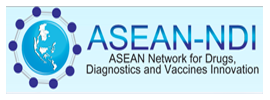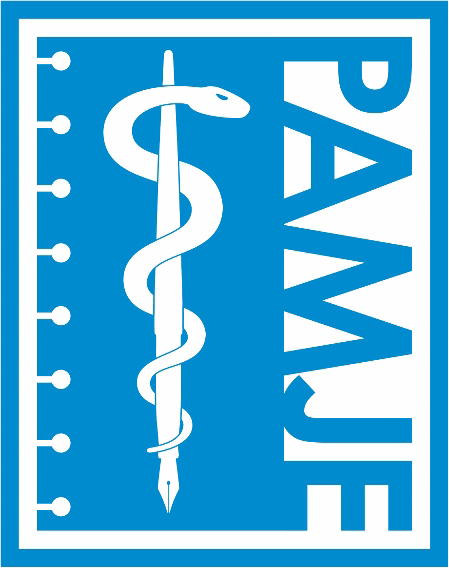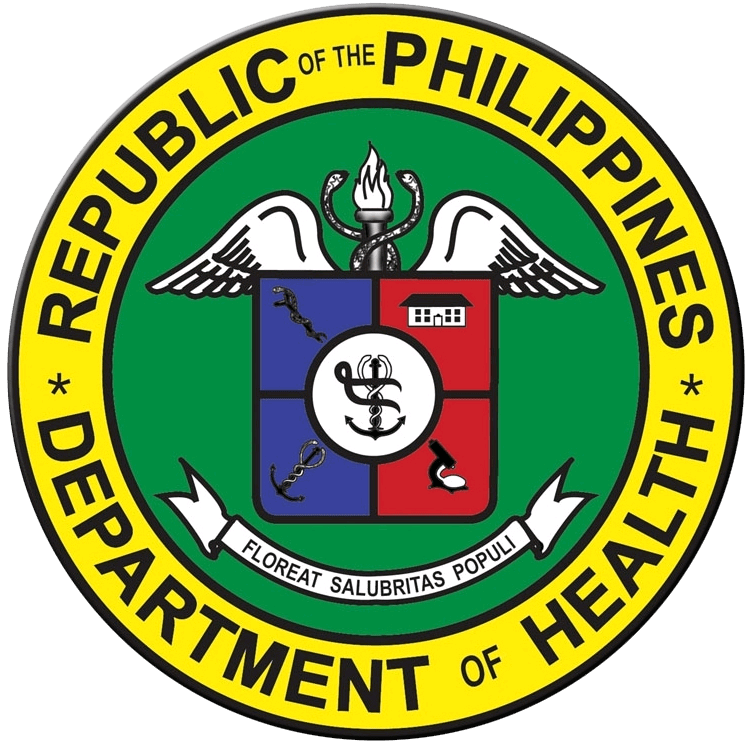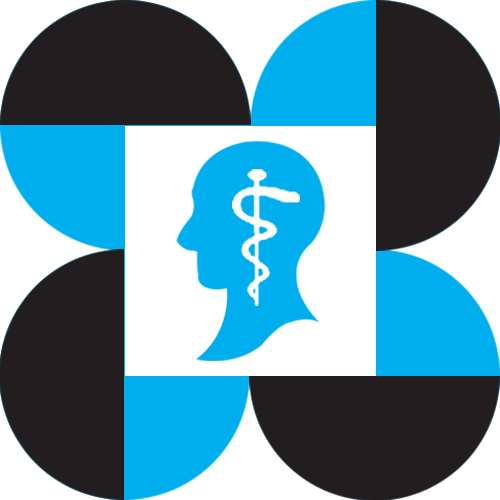BCHRD delegates attended the PNHRS week in Plaza del Norte, Laoag City, Ilocos Norte from August 7-9, 2013. The theme “People at the Center of Health Research” was reflected in the poster of each consortium. The BCHRD’s poster portrayed the target research undertakings as strategies towards the improvement of health conditions of Bicolanos.
The PNHRS celebration was a venue for the researchers to disseminate findings for evidence based practice. Dr. Ma. Lourdes K. Otayza, Chair of the Region 1 Health Research and Development Consortium and the host of the activity enjoined everyone to interact and learn from one another to pursue the common goal of making a difference in the lives of every Filipino.
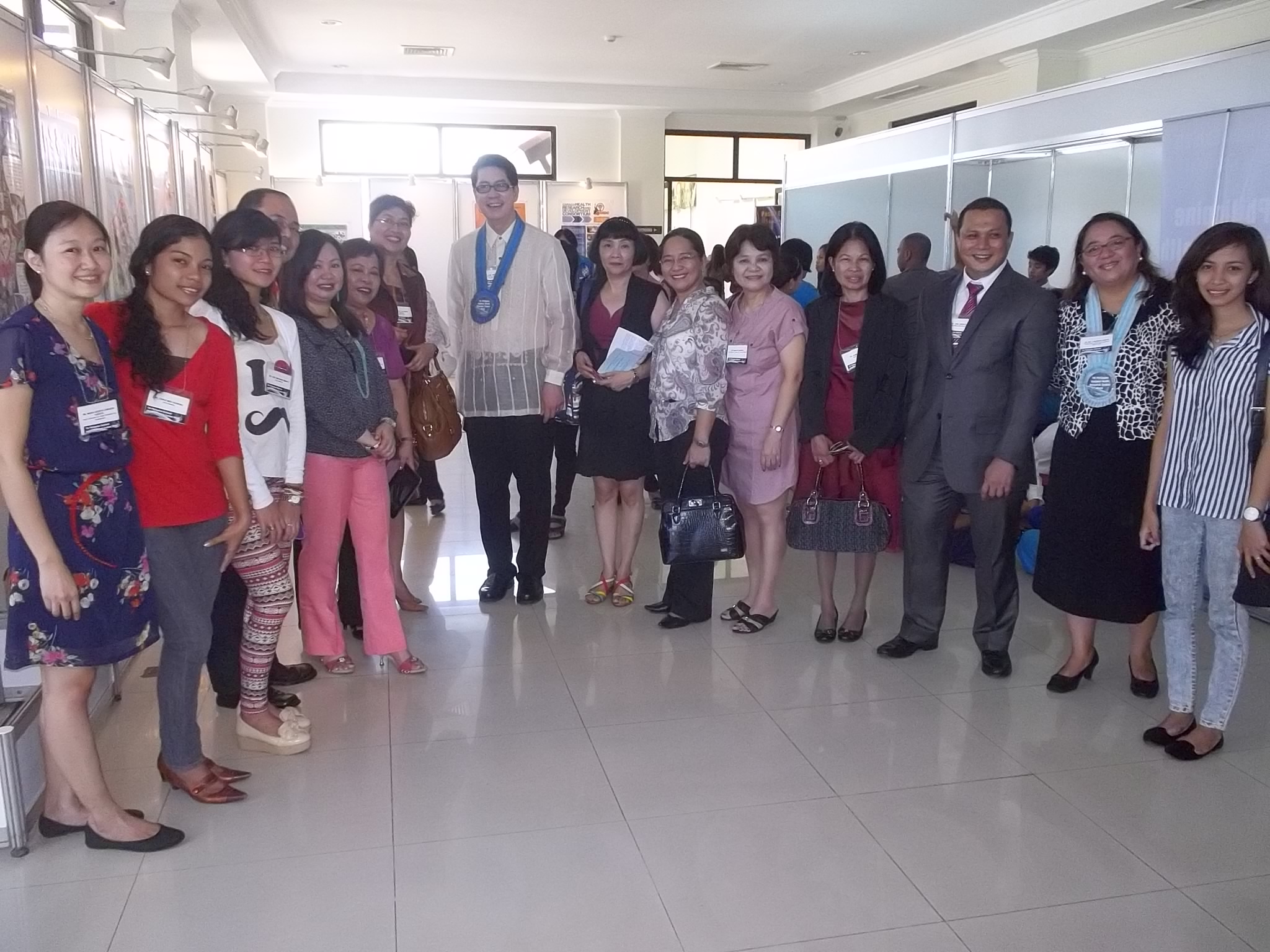
[Above, the BCHRD delegation headed by Chair and Bicol University President Dr. Fay Lauraya (7th from left) with PCHRD Executive Director Dr. Jaime Montoya (8th from left) and R1HRDC Chair and convention host, Dr. Lourdes Otayza (2nd from right).]
The BCHRD contingent was headed by the BCHRD chair and President of Bicol University, President Fay Lea Patria Lauraya. Among the delegates of the BCHRD were Director Dr. Alma Banua, the Committee chairs namely: Sandy Lasa of Ethics Review Committee, Dr. Marlyn Daguno, Research and Development Committee, Ma. Laarni Salcedo, Capacity Building Committee, and Dr. Rafaelita Lucena, Research Information, Dissemination and Utilization Committee. Also with the group were Dr. Marilou Tino and Dr Bienvenida Oliva of University of Saint Anthony, members of the CBC, Dr. Alvin Ogalesco and Prof. Joel Olfindo of Catanduanes State University, Dr. Ruben Caragay and Dr. Teresita Yap of BU College of Medicine, Dr. Ma Clara Rubino, member of R & D and Dean of Ateneo de Naga University College of Nursing; Prof. Michael Montealegre, Faculty of BU College of Science, Ms. Mary Grace Estanislao, alumna of BU College of Nursing; Ms. Erika Mae Achaval and Ms. Cris Ann Mari Amante, alumnae of BU Polangui Campus; and Maria Vicenta Corazon Guidote, BCHRD Project Assistant.
Among the topics shared were: Indigenous Peoples Health: Research Challenges in IP Communities, Ethics in Health Research, Student and Faculty Research Competition, PNHRS Law, among others.
Ms. Estanislao, a finalist in the paper presentation for the student category, presented her group’s study titled “The Hypoglycemic Effect of Ethanolic Peel Extract of Citrus sinensis (Orange) on Male Alloxan-Induced Diabetic Albino Mice (Mus musculus).” Other papers submitted for presentation during the convention by BCHRD were: “The Case of Paralytic Shellfish Poisoning (PSP) Incidence in Sorsogon Bay” by Prof. Montealegre, et.al. and “Development of Moringa oleifera Seed Antibacterial Ointment” by Ms. Achaval, et.al.

BCHRD TAKING STEPS TO ACHIEVE ITS VISION…
By: Dr. Alma Sorrera-Banua, Director, BCHRD
The vision of BCHRD is to conduct health and health-related researches responsive to the needs of the Bicolanos towards improved quality of life. Several strategies are being undertaken for the actualization of the vision. These are as follows: 1) Conduct proposal writeshop, 2) Technical & ethical review 3) Submit proposals for funding; other strategies are underway such as the conduct approved proposals.
Four research proposals were submitted for funding to different funding agencies. Three were submitted to the Philippine Council for Health Research and Development and one to BU Research and Development Center. A summary of the status of the said research protocols is show below.
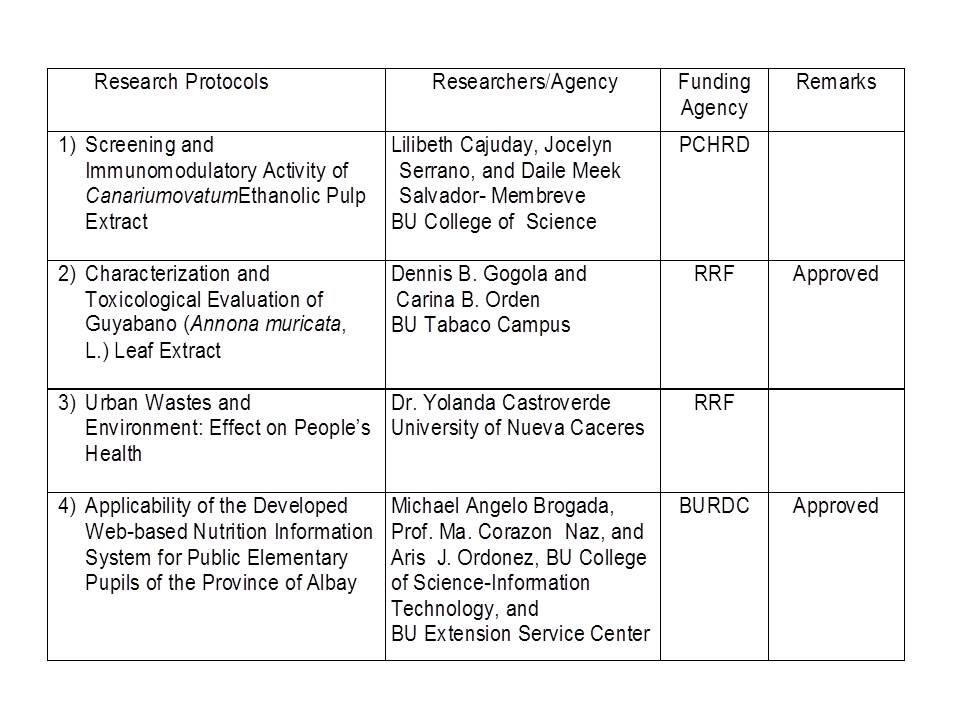
Meanwhile Dennis B. Gogola of BUTC will be signing the Memorandum of Agreement between PCHRD and BUTC, for the utilization of the research fund allocated for the research “Characterization and Toxicological Evaluation of Guyabano (Annona muricata, L.) Leaf Extract”
The BCHRD is presently into a multidisciplinary research proposal that will focus on the Promotion of Maternal Health of Bicolanos: Bicol Women’s Health Research and Development Program so as to be able to submit to PCHRD additional protocols for funding. This activity will involve the different member-agencies of the consortium. The 2nd phase was held on August 19-20, 2013 at the University of Anthony, Iriga City.
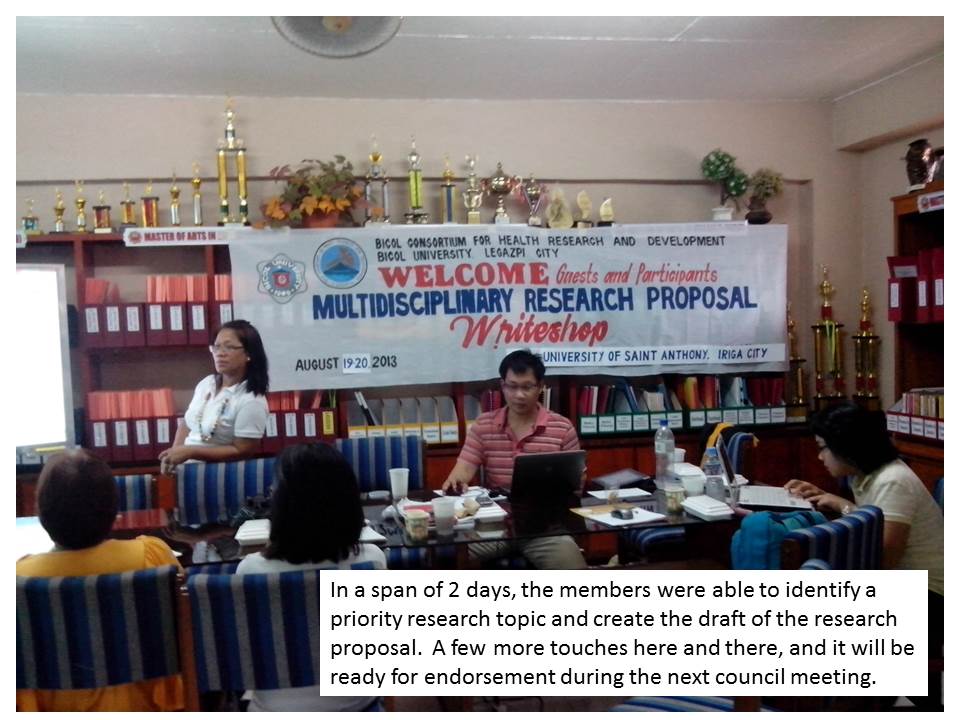
 The Bicol Consortium for Health Research and Development (BCHRD) conducted an Ethics Training on Standard Operating Procedures (SOPs) at Bicol University College of Nursing, Hospital Room on June 18-19, 2013. The General Objective of this training is to develop the standard operating procedures (SOPs) of the Ethics Review Committee (ERC) for quality assurance. Specifically, it aimed to: 1)Discuss the rationale for the development of SOPs; 2) Identify specific activities of the ERC that need SOPs; 3) Identify the individuals/officials/members that participate in each of these activities; 4) State the rationale and objective of each SOP; 5) Develop the flow chart of each activity, and; 6) Use the PHREB template in the documentation of each SOP.
The Bicol Consortium for Health Research and Development (BCHRD) conducted an Ethics Training on Standard Operating Procedures (SOPs) at Bicol University College of Nursing, Hospital Room on June 18-19, 2013. The General Objective of this training is to develop the standard operating procedures (SOPs) of the Ethics Review Committee (ERC) for quality assurance. Specifically, it aimed to: 1)Discuss the rationale for the development of SOPs; 2) Identify specific activities of the ERC that need SOPs; 3) Identify the individuals/officials/members that participate in each of these activities; 4) State the rationale and objective of each SOP; 5) Develop the flow chart of each activity, and; 6) Use the PHREB template in the documentation of each SOP.
The Resource Speakers for the said event were two members of the Philippine Health Research Ethics Board (PHREB) Marita V.T. Reyes, M.D., Chair of the National Ethics Committee and Co-Chair), and Cecilia V. Tomas M.D., who was a resource Speaker during the BCHRD Basic Training on Health Ethics in 2012, is Chair of its Subcommittee on Standards and Accreditation.
The event was attended by the same participants who had undergone the BCHRD Basic Training on Health Research Ethics in 2012, who were from the different member agencies of BCRHD. They Marlyn A. Daguno, Dr. Salvacion S. Macinas, Dr. Gabriel R. Peñas and Ramil O. Juloc from Bicol Regional Traning and Teaching Hospital (BRTTH), Alvin C. Ogalesco from Catanduanes State University (CSU), Fr. Tirso P. Elopre and Dr. Heriberto B. Fornoles from Bicol Medical Center (BMC), Pilita O. Lucena from Department of Science and Technology (DOST V), Ida Francia H. Revale, Jean Annette S. Ibo, Charmaine A. Malonzo, and Richard L. Bartolata from Bicol University (BU), Sandy C. Lasa, Virginia C. Reyes, and Nenette L. Abrigo from Universidad De Sta Isabel, Dr. Aurora Teresa M. Daluro from Department of Health (DOH), Alma S. Banua (BCHRD Director), Marie Jeanne Berroya, PCHRD-DOST (Regional Project Officer for Region V) and Ruben C. Alcazar Jr. (PHREB Secretariat), and the BCHRD secretariat composed of Ms. Maria Vicenta Corazon B. Guidote, Joemar N. Asiado and Daphne E. Orr.
 The 2-day training consisted on lectures and workshops. Among the topics discussed were: The PHREB Accreditation Program and Policies, Review of ERC Functions & Overview of SOP Sections, Revisiting the Review, After Review Processes, Documentation and Archiving, and Issues and Challenges. The workshops consisted of the drafting of SOPs for the different regular activities undertaken by an ethics board.
The 2-day training consisted on lectures and workshops. Among the topics discussed were: The PHREB Accreditation Program and Policies, Review of ERC Functions & Overview of SOP Sections, Revisiting the Review, After Review Processes, Documentation and Archiving, and Issues and Challenges. The workshops consisted of the drafting of SOPs for the different regular activities undertaken by an ethics board.
The training ended with a determined note on the part of the participants to finalize the requirements needed to establish Ethics Review Committees in their own institutions. For their part, the resource speakers promised to go over the various SOPs submitted during the workshop and to be returned back to the participants.
Very keen on realizing its objective of capacitating local researchers interested in health and health-related studies, the BCHRD conducted the Research Evaluation Training with the twofold goal of aiding the Research Proposal Evaluation Team in developing a tool for evaluating research proposals, and assisting researchers in fine-tuning their revised proposals.
The consortium’s Evaluation Team is composed of the Research and Development (R&D) and Ethics Review (ERC) Committees. The research proponents invited to the training were those who participated inthe Research Methods Training conducted on January 29-31, 2013 at Bicol University, Legazpi City.
The Research Evaluation Training, held on February 27-28, 2013 in Naga City, at the Universidad de Sta. Isabel (USI) College of Nursing Lecture Hall, was the second phase of the Health Research Proposal Packaging Process (HRPPP), which the BCHRD is implementing; the Research Methods Trainingin January was Phase I of the process.
The Participants were: Prof. Sandy C. Lasa of USI, chairman of the ERC; other USI faculty- Profs Janet S. dela Cruz, Teresa B. Pambid, Glenda C. Icaro, Mary Ann Tumbado, and Mr. Rhandy V. Salvani; Prof. Elma R. Peralta and Dr. Ma. Clara Ll. Rubino Faculty and Dean respectively of Ateneo de Naga University (AdNU); Dr. Yolanda L. Castroverde and Dr. Carmelita S. Baylon of the University of Nueva Caceres (UNC); Dr. Raul G. Bradecina, Profs. Ana L. Vargas, and Emelina R. Padayao of Partido State University (PSU); Dr. Nilo B. Romeroso of Ago Medical Center-Bicol Christian College of Medicine (AMEC-BCCM); Prof. Joyce S. Obis of University of Saint Anthony (USANT); Prof. Athena G. Masip of Aquinas University of Legazpi (AUL); researchers and BCHRD committee members who were part of the Bicol University delegation included Dr. Richard L. Bartolata (BUCN), Profs. Ida Francia H. Revale and Daile Meek Salvador-Membreve (BUCS), Profs. Michael Angelo D. Brogada and Aris J. Ordoñez (BU CS-CS/IT), Prof. Ma. Corazon R. Naz, (BUESC), Profs. Carina B. Orden and Dennis B. Gogola (BUTC), BCHRD Director Dr. Alma S. Banua, and the BCHRD Secretariat composed of Ms. Reizha O. Rito and Ms. Maria Vicenta Corazon B. Guidote. Also present was Ms. Marie Jeanne “Gigi” B. Berroya, PCHRD-DOST Regional Project Officer for Region V.
Resource speaker for the activity was Dr. Godofreda “Jody” V. Dalmacion, M.D., MSc, MHPEd, FPOGS- a professor at the Department of Pharmacology and Toxicology, and Assistant Director of the Department of Clinical Epidemiology, College of Medicine, University of the Philippines (UP), Manila. Dr. Jody earned the overwhelming respect of the participants with her sincere, pro-active approach. The research proponents appreciated the one-on-one sessions they had with her, and her promise to read their revisions. Assisting Dr. Jody was her very able co-facilitator, Mr. Juan Carlo “JC” G. Remulla, R.N., a University Researcher at UP Manila- National Institutes of Health.
The training ended with setting of the deadline for submission of revised proposals to the BCHRD secretariat, (total of 5 proposals) and finalization of the R&D and ERC Standard Operating Procedures.The two-day training/seminar involved pre- and post-tests, lectures, small group discussions, and critiquing of proposals.
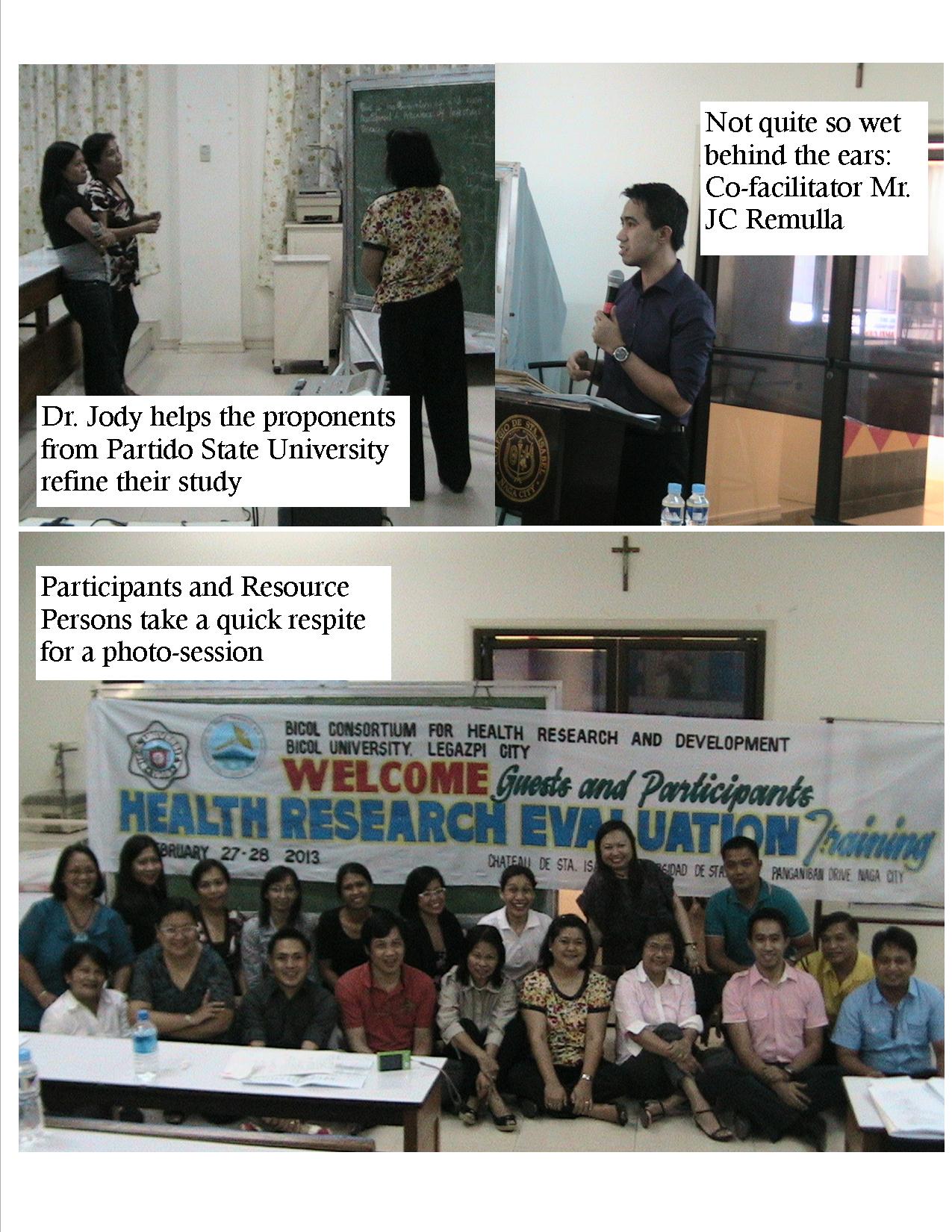
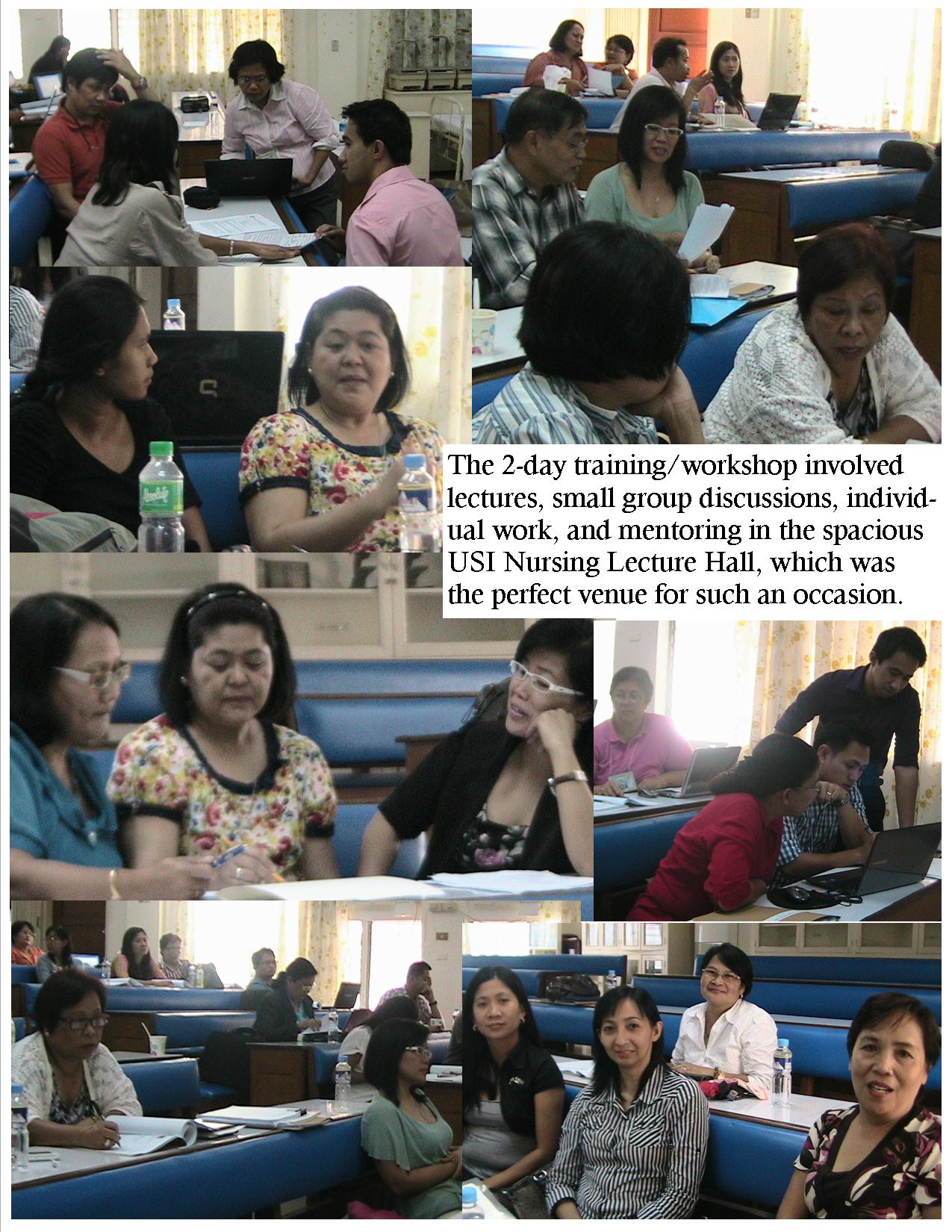
The aim of the Philippine National Research Health System of ensuring that the health research is linked to the needs of our health system is cascaded to the vision of the BCHRD, of producing excellent health researches that are responsive to the needs of Bicolanos. In order to achieve the vision, this 2013, the BCHRD is working on packaging health and health related research proposals. This was expressed during the welcome address of Dr. Alma Banua, the consortium director, wherein she enjoined the participants to undertake the Health Research Proposal Packaging Process (HRPPP) with the consortium.
The HRPPP was conceptualized based on the principle of learning by doing by Aristotle. It is comprised of lectures by a resource speaker and workshop/application of the learning, thus the invited participants come with a research proposal that is refined as they undergo the HRPPP. The review of the research proposal is done by the Research and Development and Ethics Review Committees together with an expert recommended by the PCHRD-DOST.
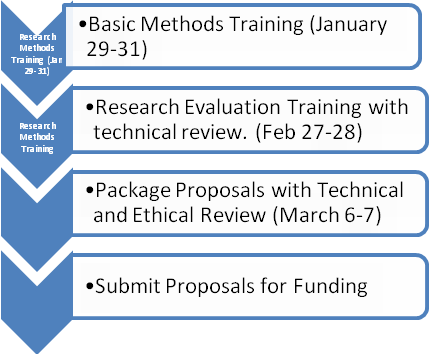
The HRPPP is comprised of 3 phases, Phase 1:Basic Methods Training held on January 29-31, consisting of concepts on objective setting, research design and data analysis; Phase 2:Research Evaluation Training with technical review (Feb 27-28); and Phase 3:Package Proposals with Technical and Ethical Review (March 6-7). At the end of the process is a full blown proposal ready for submission to the funding agency.
Fifteen (15) research proposals were presented by the research participants from the member agencies. It was short listed to six (6) – all of which were aligned to the National Unified Health Research Agenda (NUHRA) and/or Regional Unified Health Research Agenda (RUHRA).
These six proposals are:
- Joel Olfindo et al- Biomedical Waste Management Practices in Government Health Care Facilities in Catanduanes
- Elma P. Peralta & Marlyn A. Daguno- Total Financial Cost of Motor Vehicular Accident Patients Admitted at BRTTH
- Dennis B. Gogola & Carina Orden- Wound Healing Properties of Guyabano Leaf and Malunggay Leaf Extract
- Jocelyn E. Serrano- Biological Activities of Pili Pulp Extracts
- Joan Nace- Phytochemical Characterization, Antimicrobial Screening, and Histological Study of Orthosiphon aristatus (Balbas Pusa)
- Michael Angelo B. Brogada- Feasibility of a Web-Based Health Status Monitoring and Decision Support System for Public Elementary Pupils of the Province of Albay
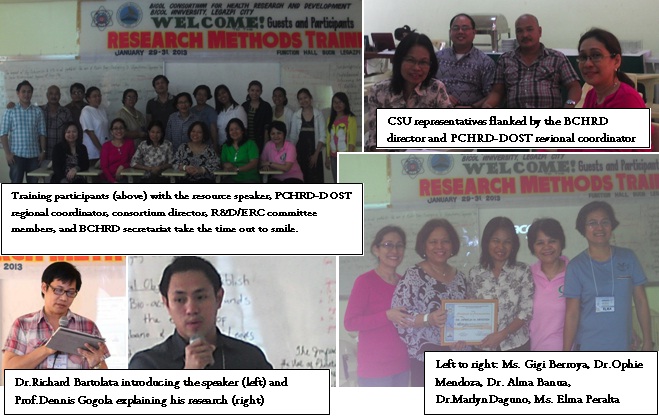
The Bicol Consortium for Health Research and Development (BCHRD) organized a three-day Research Methods Training on January 29-31, 2013 with the following objectives: 1) Equip the participants with research methodologies; 2) Assist participants in refining the methodology of their research proposals; and 3) Assist the participants in packaging the research proposals, in preparation for the technical and ethical review by the consortium evaluators.
The training was facilitated by the Consortium Director Dr. Alma Banua and the PCHRD-DOST Regional  Coordinator Ms. Marie Jeanne Berroya. It was participated by the chairpersons and members of the BCHRD Research and Development (R&D) and Ethics Review (ERC) Committees, as well researchers from the different member-agencies of the consortium. Doctors, nurses, and professors from the different schools, institutions, and agencies came all the way from as far as Catanduanes and Camarines Sur to join their local counterparts in Legazpi City.
Coordinator Ms. Marie Jeanne Berroya. It was participated by the chairpersons and members of the BCHRD Research and Development (R&D) and Ethics Review (ERC) Committees, as well researchers from the different member-agencies of the consortium. Doctors, nurses, and professors from the different schools, institutions, and agencies came all the way from as far as Catanduanes and Camarines Sur to join their local counterparts in Legazpi City.
The member-agencies of BCHRD represented during the training were: Universidad de Sta. Isabel (USI)- Ms. Sandy Lasa; Catanduanes State University (CSU)- Dr. Alvin Ogalesco and Prof. Joel Olfindo; University of Saint Anthony (USANT)- Prof. Joyce Obis; Ateneo de Naga University (AdNU)- Ms. Elma Peralta; University of Nueva Caceres (UNC)- Dr. Carmelita Baylon and Dr. Yolanda Castroverde; Camarines Sur Polytechnic Colleges (CSPC)- Ms. Salvacion Tablanza and Ms. Ma. Angela Concepcion Nolasco; Partido State University (PSU)- Ms. Emelina R. Padayao; Aquinas University (AUL)- Ms. Athena G. Masip; Bicol Medical Center (BMC)- Dr. Marla Litam; BRTTH- Dr. Marlyn Daguno and Ms. Bernardita Patacsil; and Department of Health (DOH)- Dr. Aurora Teresa Daluro, aside from BCHRD host agency Bicol University, which had participants from the College of Nursing- Dr. Richard Bartolata and Prof. Garry Grageda; College of Science- Profs. Ida Revale, Jocelyn Serrano, Joan Nace, Daile Meek Membreve and Mr. Michael Angelo Brogada; Tabaco Campus- Profs. Carina Orden and Dennis Gogola; and RDC- Dr. Arnulfo Mascariñas. Also present were the BCHRD Secretariat composed of Ms. Maria Vicenta Corazon Guidote, Ms. Reizha Rito, and Ms. Eunice Endrano.
The participants were privileged to have as resource speaker the in-demand and highly recommended Dr. Ophelia “Ophie” M. Mendoza, a PCHRD consultant and research expert. Dr. Ophie holds several degrees including Master of Science in Public Health (Biostatistics) and Doctor of Public Health (Biostatistics) from the University of North Carolina at Chapel Hill as well as the degrees of Bachelor of Science in Statistics, and Master in Statistics from the University of the Philippines. A researcher in her own right with a considerable number of researches to her name both here and abroad, it is only fitting that she would be recommended by no less than the PCHRD-DOST itself, to give lectures during seminars that it funds.
Needless to say, Dr. Ophie did not disappoint; 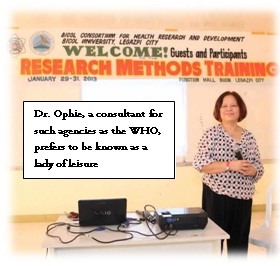 evaluation from the participants all contained rave-reviews of how well she delivered the lectures which were very comprehensive, and how she was able to simplify even the most complicated topics.
evaluation from the participants all contained rave-reviews of how well she delivered the lectures which were very comprehensive, and how she was able to simplify even the most complicated topics.
The training followed a challenging daily lecture-workshop-plenary schedule that really squeezed the creative juices out of the committee members and researchers, who were all required to give presentations as well as evaluate each other’s outputs. Dr. Ophie was on hand to assist the R&D and ERC committees in the critiquing.
On the whole the BCHRD is happy with the fifteen (15) research proposals that were presented, and hopeful that with certain revisions, they will be ready to be submitted to the R&D and ERC committees for technical review, in preparation for submission to PCHRD for final consideration. Further trainings will be held to give assistance to the researchers in the refinement of their proposals.
HERDIN stands for Health Research and Development Information Network, a research repository / database with over 40 thousand records of health research articles and health researches about the Philippines or Filipinos, authored by Filipinos or non-Filipinos, published and unpublished.
To be able to access the research information network, BCHRD organized a HERDIN training on November 28, 2012 at the Bicol University, College of Nursing. Three speakers/trainers from PCHRD came to Legazpi City to provide the participants with the knowledge and skills needed in the setting up/operating of a research database in their respective institutions that could be linked with the regional (BCHRD) and national research repositories.
The said speakers/trainers were: Mylene B. Marco who gave the mechanics of the workshop, Meychell Angoy, who lectured on the technical aspect of HERDIN, and Ronel D. Molina, who lectured on data inputting (setting up, updating, enhancing, and maintenance of the Consortia website).
The training workshop was participated by a total of twenty seven (27) point persons for research database from member and non-member agencies. The participants were given the HERDIN User’s Guide / Manual as reference for the technical aspect of HERDIN. The database can be searched for free at http://www.herdin.ph
Data inputting of the researchers and researches in Region V will be done in 2013. The inventory of these researchers and researches in the region is still ongoing.
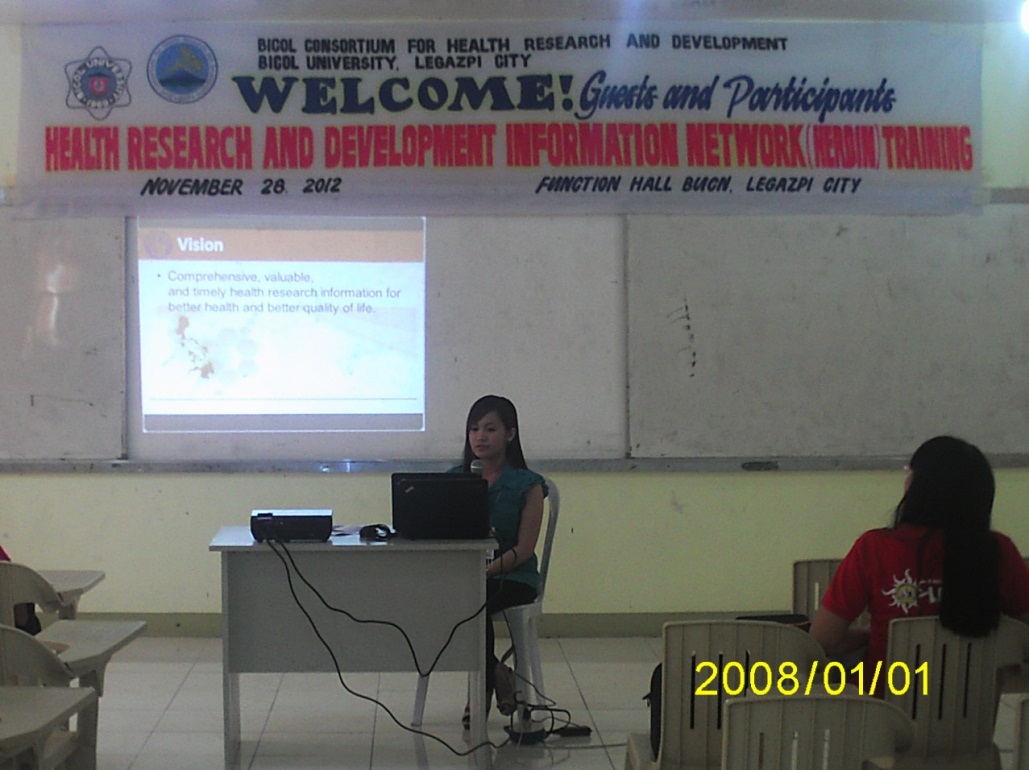
Ms. Meychell Angoy (above) explaining the technical aspect of HERDIN.
The BCHRD facilitated a two day write-shop for researchers in the region on November 14-15, 2012. Its main objective was to generate fundable research proposals that are reflective of the priority research agenda of the region.
The pre-workshop phase was highlighted by the presentation of the Research Agenda of Region V by R & D Chair Dr. Marlyn Daguno, to guide the participants on the research priorities of the region. Following the presentation were lectures on “Problem Conceptualization” and R & D Methodologies (Quantitative) including Basic Statistical Test and Analysis by Dr. Yolanda Castroverde, an R & D member, and Dr. Maridel Borja, from University of the Philippines, Manila.
Three (3) research proposals were presented and evaluated by the R & D committee (Dr. Marlyn Daguno and Prof. Elma Peralta), with Dr. Borja, as guest evaluator. The proposals were as follows: 1) Urban Wastes and Environment: Effect on People’s Health by Dr. Yolanda Castroverde of University of Nueva Caceres, 2) “Follow-on” and “Toddler Formula” Using Adlai Grains by Dr. Janet Recierdo of Bicol University, and 3) Wound Healing Properties of Guyabano Leaves (Anona muricata Linn) and Malunggay Root (Moringa oleifera) Extract: A Product Development by Dennis Gogola of Bicol University.
The research entitled Urban Wastes and Environment: Effect on People’s Health by Dr. Yolanda Castroverde was technically approved by R & D committee and was submitted to the Bicol Medical Center, Naga City for ethical review. The ERC of the consortium had already reviewed it ethically. This proposal was submitted to the Philippine Council for Health Research and Development for funding under the Regional Research Fund (RRF).
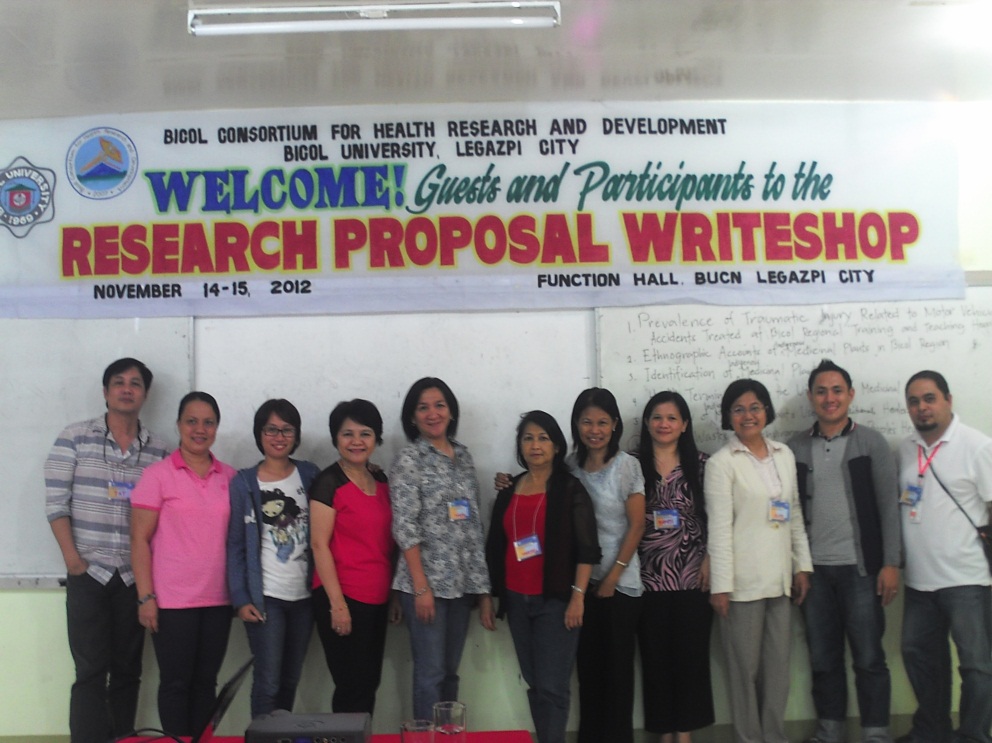
(left) Participants of the research proposal write-shop pose with R & D committee chair Dr. Daguno, committee member Prof. Peralta, and guest evaluator Dr. Borja.
The Basic Ethics training was a two-and-a-half-day training workshop (October 29-31) organized by the Philippine Health Research Ethics Board (PHREB), Philippine Council for Health Research and Development (PCHRD) and Bicol Consortium for Health Research and Development (BCHRD).
The main objective of the training was to build the capacity for quality ethics review processes in research institutions. A total of twenty four (24) participants composed of the member institutions of the BCHRD and allied health workers of health agencies in Region V were the recipient of the research ethics concepts.
The speakers from the PHREB were: Dr. Cecilia Tomas, Chair of the PHREB-Subcommittee, Standards and Accreditation and Dr. Maria Salome Vios. With them were two members of the PHREB Secretariat, Ms. Marie Jeanne Berroya, who is also the Regional Coordinator for Region V and Mr. Nico Angelo Parungao.
The participants were welcomed by Dr. Alma Sorrera-Banua, BCHRD Director and Dr. Amelia Dorosan, VPAA of Bicol University, who mentioned the importance of respecting the rights of subjects of the research, of organizing an institutional ERC, and of maintaining a functioning ERC.
Among the topics discussed were the following:
1) Ethical Principles in Research (International & National)
2) Ethics and Ethical Issues in Research Proposal
A. Benefits/Risk Assessment
B. Informed Consent
C. Ethics Review Committees and Review Process
D. Ethical Issues: Vulnerable Participants, Conflict of Interest, Inducements, Use of Biologic Samples, Community Considerations
3) PCHRD Registration & Accreditation of ERCs
4) Authorship & Publication
5) SOPs for ERCs
6) National Framework for Protection of Human Research Participants

The participants were able to realize the importance of ensuring that researchers follow the highest ethical standard, observe the safety of the human participants, and ensure the quality of research output.
BCHRD Director Dr. Alma Banua welcomes the participants during the Basic Ethics Training.
The Bicol Consortium for Health Research and Development conducted a Strategic Planning Workshop last October 9-10, 2012 at the Bicol University College of Nursing, Legazpi City. The objective of the workshop was to 1) identify and understand the BCHRD’s internal and external environment, including the major trends and events affecting it; and 2) generate/formulate a shared Vision, Mission, Goals/Objectives and Strategies for the BCHRD within the next 3 years.
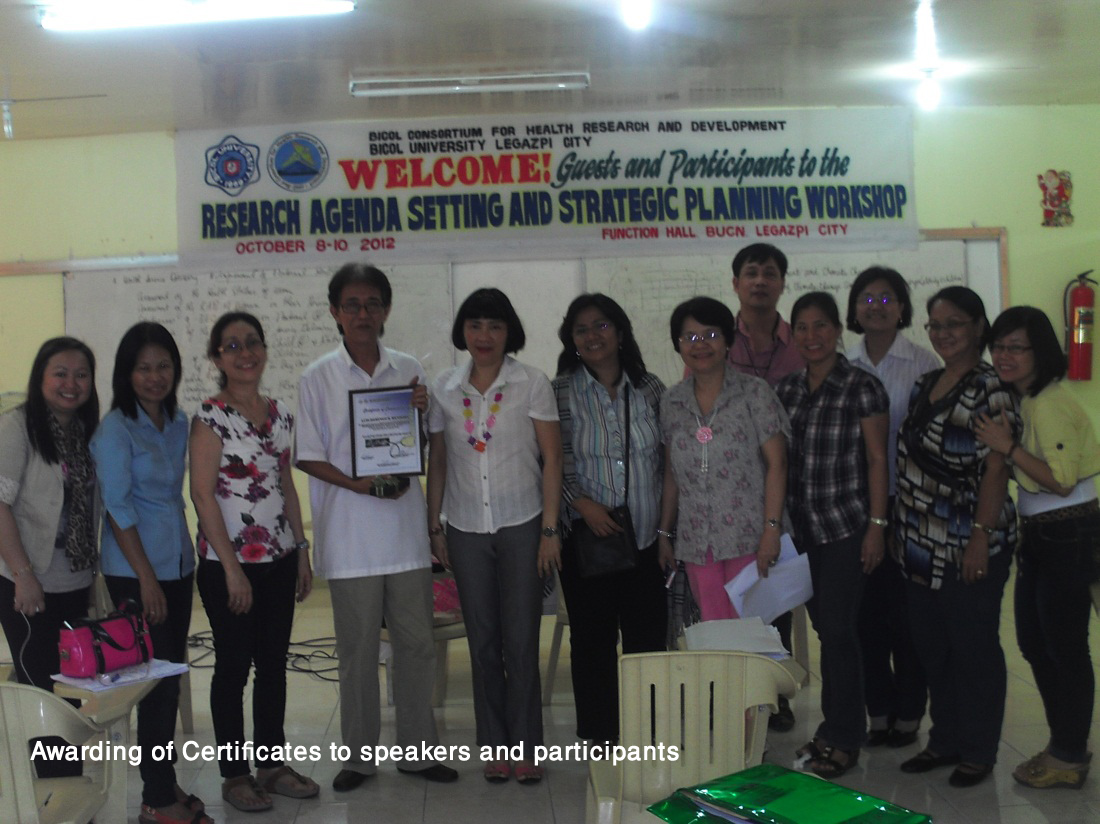
The activity was facilitated by Engr. Ellen P. San Juan, President & Managing Director of Transformation OptimizerProfessionals Inc. A total of thirteen (13) member agencies participated and came up with the Vision, Mission, Goals, Objectives, CoreValues, and the SWOT analysis for the operation of the consortium. The output of the workshop was as follows:
Vision: We are a nationally recognized from prime mover of excellent health and health related researches responsive to the needs of the Bicolanos towards improved quality of life.
Mission: We are a consortium of committed research institutions that produce quality health researches adhering to the highest ethical standards by collaborating with stakeholders and building the capacity of the researchers in the Bicol Region.
Goals:
1. Quality of Researchers: enhancement of researchers’ capacity and capability
2. Researches: undertake quality health and health related R & D activities
3. Recipient of various institutional awards from recognized award-giving bodies.
4. Establishment of linkages between and among S &T / R & D networks.
5. To produce quality researches that will improve the health conditions of Bicolanos.
6.To establish a dynamic, innovative, and collaborative organization that upholds good governance.
Specific Objectives:
- To increase the number of competent researchers by at least 3% in 3 years.
- At least 3 completed collaborative researches.
- To publish 3 completed research in peer reviewed journals.
- Come up with 9 approved quality health researches and receive at least 3 major awards from recognized award-giving bodies: (PNHRS, CHED Zonal Research Center, CHED- NHERA, and FNRI)
- Establish and strengthen linkages between and among Research and Development / Science & Technology networks.
- Produce one health research program on Maternal and Child Health and Nutrition for implementation of concerned institutions.
- Increase the number of member institutions by 50 per cent.
Core Values
- Commitment
- Integrity
- Innovativeness
- Respect
- Teamwork
Strengths
1. Internal Strengths
a. Increased number of committed member institutions/ agencies
b. Strong research capabilities of member institutions/ agencies
c. Basic training programs in place
d. Desire to make committees functional
e. Drafted research priorities for the region
f. Initial re-alignment of R & D’s with the NUHRA by some member institutions.
g. Capability to conduct clinical/ experimental researches.
h. Availability of ISO accredited Analytical Laboratory ( DOST )
i. Availability of IPOPHIL office at BURDC
j. With ongoing inventory of researchers, researches, and their training needs
k. Strong commitment of member institutions
l. Well-defined mission and vision
m. Well-established research department with member institution
n. ISO-accredited RDC of the base institution - Bicol University
o. Expanding membership from 5 to 15.
p. Committed pool of researchers (multidisciplinary with ISO accreditation)
2. External Opportunities
a. Wide S & T networks
b. More funding institutions (e.g. DOST central office, JICA, WHO, UNESCO, UNICEF, FAO, KOIKA, AECID, National and Local Government agencies)
c. Supportive partner institutions
d. Develop in-line linkage with international institutions like hospitals and universities (E-Libraries)
e. Bilateral Cooperation between BCHRD & institution abroad - exchange researchers
f. Existence of PCHRD scholars’ society
g. Strong support of the government (RA 8503 and HB 564)
h. Regional economic growth of 26%
i. Liberalization of the telecommunication industry
j. Technology transfer
k. Access to seminars trainings in and out of the country
l. Good governance (LGU’s receptive to research undertakings and utilization of research findings)
Threats
1. External
a. Priority program of Government (National Local)
b. Lack of support from private hospitals in conducting research and implementation of research outputs
c. Problems in peace and order situation
d. Inaccessible research settings
e. Lack of support from External Funding Institutions
f. Lack of awareness and support from the community
a. Change of government due to elections, priorities/ agenda, funding, mechanism, choice of people (cabinet, etc.)
b. Pressure / enforcement by international groups
c. World trend (can’t cope)
g. Undefined linkage between health researchers, policy makers, health program developers, and practitioners
h. Region 5 unemployment rate of 37.7% as of July 2012
i. Increase in population (2.7%)
j. Magnitude of poverty
k. Social development challenges
l. High percentage in terms of not meeting family planning needs of the region
2. Internal (Areas of Improvement)
a. Minimal research output
b. Low level of information dissemination and utilization of research output
c. Low level of interest to conduct research
d. Absence of strategic direction and long term development plan
e. Limited resources (manpower, financial constraints, etc.)
f. Absence of office and other facilities
g. Internal policies that restrict the consortium operation
a. Institutionalization not yet realized
b. BCHRD Operations with reference to base agency/ member institutions, office, financial management, other support services
h. Lack of skills among members of respective departments of member institutions
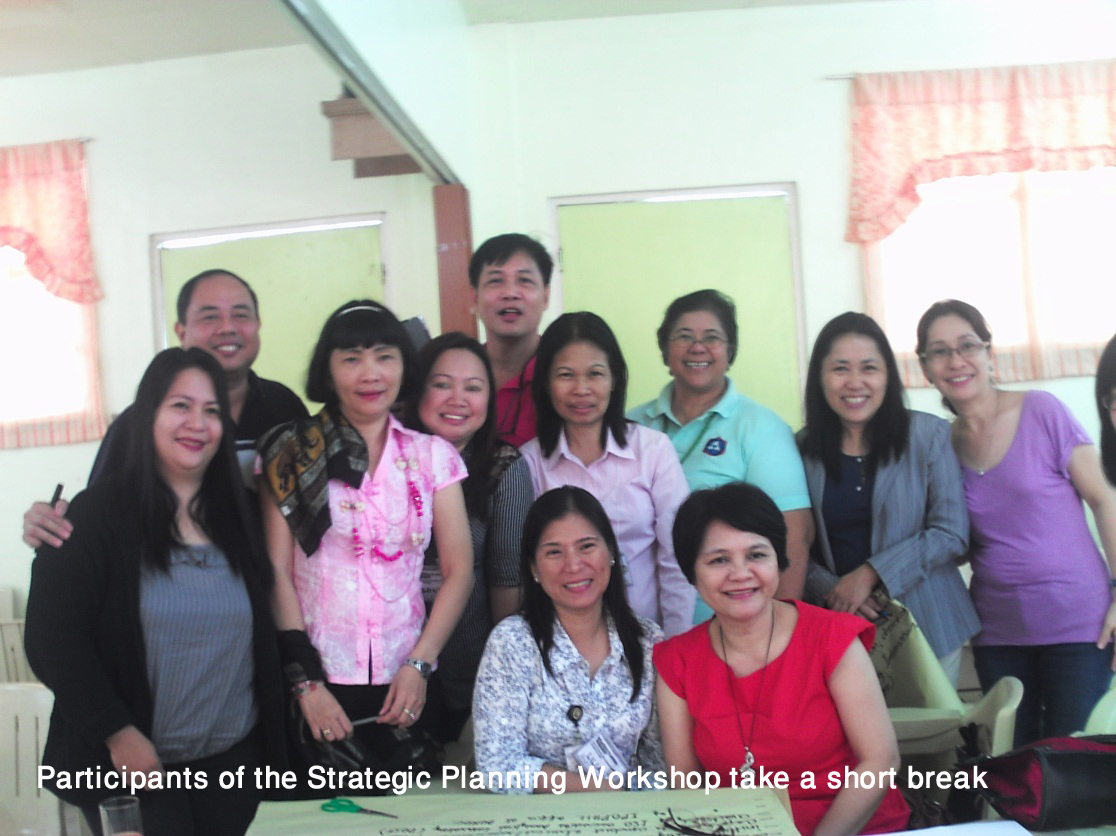
The Bicol Consortium for Health Research Development held a one day Research Agenda Setting Workshop last October 8, 2012 at the Function Hall of Bicol University Legazpi City. Its objective was to identify areas for research that should be given high priority in the region.
The BCHRD members were welcomed by Dr. Alma Banua, the consortium director. Dr. Fay Lea Patria Lauraya, BU President and BCHRD Chairperson delivered an inspirational message, focusing on the importance of research to the Bicolanos. She emphasized researches on Indigenous Herbs in the Region that can be linked to “Tuklas Lunas”, a drug discovery and development program initiated by DOST-PCHRD to provide solutions to the country's medical needs.
There were thirteen member-agency-participants, namely: Elma Peralta (Ateneo de Naga University), Lilian Legson & Hermogena Cañares (Aquinas University of Legazpi), Richard Bartolata (Bicol University), Marlyn Daguno (Bicol Regional Training and Teaching Hospital), Pilita O. Lucena (Department of Science and Technology), Sandy Lasa (Universidad de Santa Isabel), Carmelita Baylon (University of Nueva Caceres), Marla Litam, M.D. (Bicol Medical Center), Joyce Obis (University of Saint Anthony), Dr. Luis Mendoza (Department of Health-Albay Division), and Marie Jeanne Berroya ( Regional Project Officer for Region V from PCHRD).
The workshop proper started with the presentation by Director Banua of statistical data on the health profile of region V. It was followed by a “Problem tree analysis” facilitated by Dr. Yolly Castroverde.
Five Thematic Areas identified during the workshop were as follows: 1) Health service delivery, 2) Health Development, 3) Socio-environmental health concerns, and 4) Health Technology Development, and 5) Health financing. Following is The Research Agenda For Region V.
A. HEALTH SERVICE DELIVERY
1. Improvement of Maternal Health and Nutrition
a. Assessment of the health status of women
b. Assessment of the KAPs of women in their Perinatal Period
c. Effectiveness of IEC materials on maternal health care
d. Evaluation of the maternal health service delivery
2. Improvement of Child Health and Nutrition
a. Assessment of the Health Status of Children
b. Assessment of Feeding Programs in Day Care Centers (3 -6 y/o)
c. Infant Feeding Program
d. Review and Analysis of the Existing BEmONC/CEmONC in terms of Facilities, human resource expertise, usage and usefulness
e. Compliance with EPI
f. Evaluation of the Family Planning Program
B. HEALTH DEVELOPMENT
1. Prevention of Non-communicable Diseases
a. Mental Health
b. Lifestyle Diseases (diabetes, hypertension, cardiovascular diseases)
c. Trauma and Injuries
2. Prevention of Communicable Diseases
a. STI & HIV
b. TUBERCULOSIS (MDR)
3. Herbal Plants in Various Forms
a. Inventory of Herbal Plants in the Bicol Region(including pictures, location, parts of the plants used, common names and uses)
b. Preparation and utilization of indigenous herbs for common illnesses
c. Dosage forms of herbal medicine
4. Functional Foods
Beneficial/potential hazards of the following: Malunggay, Ginger, Garlic, Yakon, Cassava and Siling Labuyo
C. SOCIO- ENVIRONMENTAL HEALTH CONCERNS
- Environment and Climate Change
A. Health effects of Climate Change among Vulnerable Groups (Elderly and Children)
- Community Development
- Health and sanitary practices among residents of resettlement areas
- Health preparedness and capabilities during emergencies
- Waste Management
- Level of Implementation of Local Ordinances on Waste Management
- Hospital Waste Management
D. HEALTH TECHNOLOGY DEVELOPMENT
- Technology Development
- Techno Verification on for health use.
- Utilization and Production of Yakon Chips as Dietary Food Supplement
- Knowledge Management
- Adoption of Health Data Base System in the Bicol Region
- Surveillance of Reported Infectious Diseases
F. HEALTH FINANCING
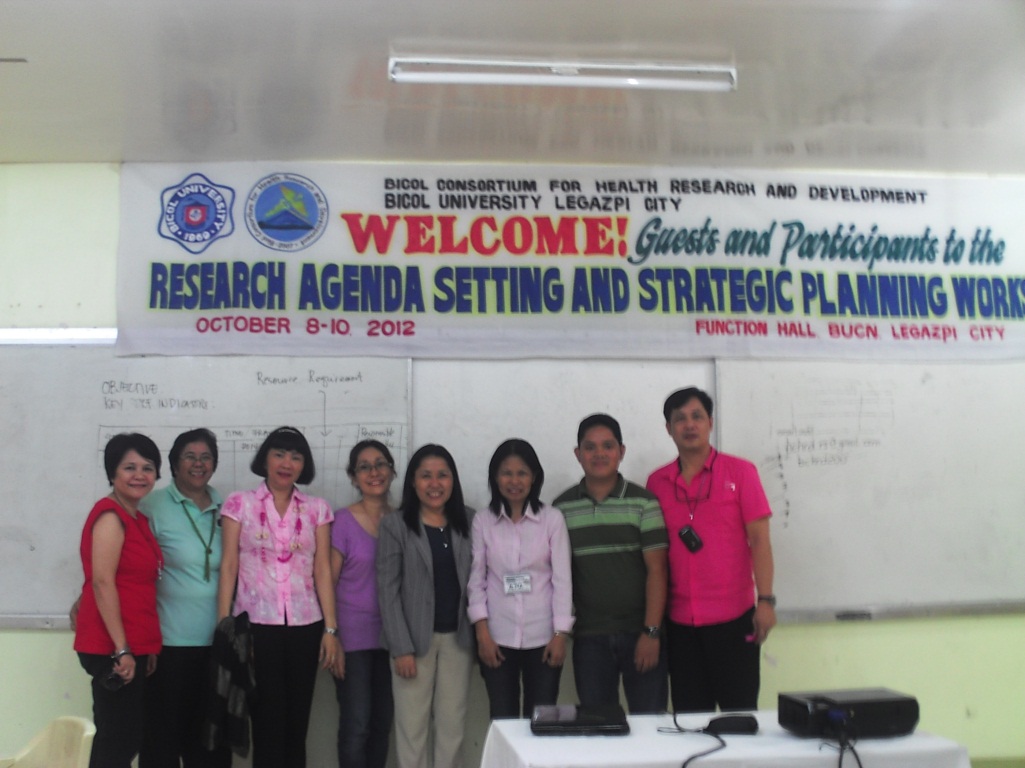
The participants during the two-day gruelling Research Agenda Setting and Strategic Planning Workshop.
The 1st Regional Health Research Council Meeting of BCHRD was held on September 4, 2012, at the BU-GASS Legazpi City. It was attended by the heads of the member-agencies of BCHRD, consortium Chair President Fay Lea Patria Lauraya, consortium Director Dr. Alma Banua, and no less than PCHRD Executive Director Jaime Montoya.
During his message Director Montoya discussed the role of the Philippine Council for Health Research and Development (PCHRD) as the Heart and Soul of the Philippine National Health Research System (PNHRS), and that its mission is to make life better for the Filipinos through health research. Through the PCHRD health research consortia nationwide were established, to be capacitated institutions in research, and to serve as research hubs. He emphasized that the best people to undertake research are those who know their needs and who will benefit from the results of their researches.
Among the agenda were the following: Matters for Approval including 1) Proposed BCHRD Logo; 2) Policy matters (Rotation of special committee meetings and Criteria for acceptance of additional members) and Annual membership fee, and Matters for Information including 1) Change in the schedule of project operations, 2) Present committee members, 3) Status of BCHRD Activities, and 4) Signing of MOA.
There are a total of thirteen member agencies within the consortium, duly represented by the following participants of the council meeting: Engr. Seth Baranddon of Camarine Sur Polythecnic College, Luzviminda de Villa of University of Saint Anthony, Carmelita Baylon and Dr. Yolanda Castroverded of University of Nueva Caceres, Fr. Ernesto Arceo of Aquinas University, Dr. Salvacion Macinas and Dr. Marlyn Daguno of Bicol Regional Teaching and Training Hospital, Dr. Marla Litam of Bicol Medical Center, Director Tomas Briñas of DOST RV, Dr. Teresa de Alban of CHED RV, Ms. Marie Jean Berroya and Ms. Carina Rebulanan of PCHRD.
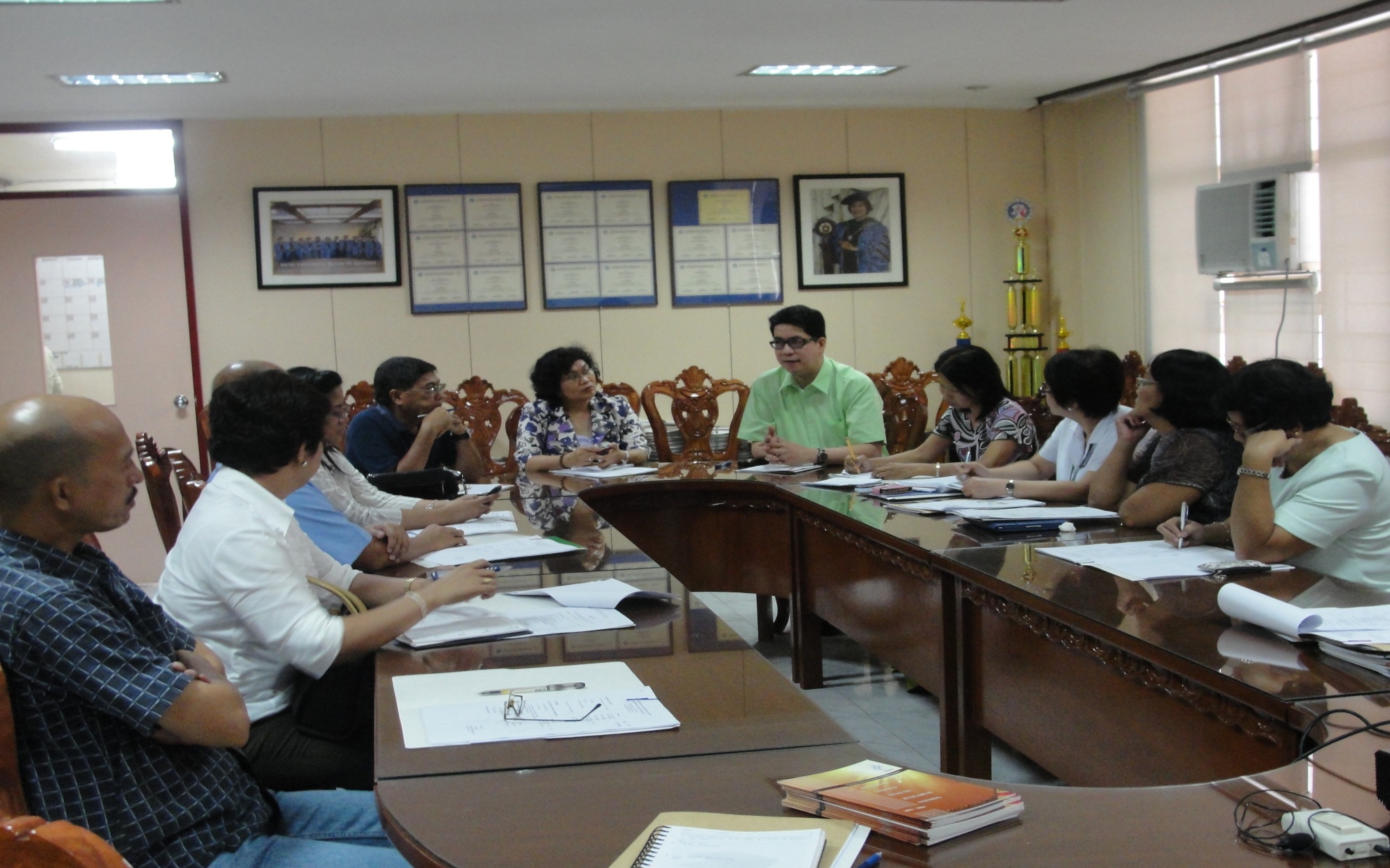
Dr. Jaime Montoya giving a message, and focusing on the importance of the role of BCHRD in research, particularly on research priorities-NUHRA.
The Bicol Consortium for Health Research and Development (BCHRD) was established by the Philippine Council for Health Research and Development (PCHRD), in order to make life better for the Bicolanos through health research. It was organized here Region V in 2007 where Ago Medical and Educational Center became its first base agency.
By the virtue of the Memorandum of Agreement between the PCHRD and DOST and Bicol University (BU), the BCHRD is now based in BU , Legaspi City, with Dr. Fay Lea Patria Lauraya, President of Bicol University as the Chairperson and Dr. Alma Banua as the consortium Director.
The primary objective of BCHRD is to institute/strengthen the system of collaboration in Bicol to develop and enhance capacity of research institutions within the region which has interest and engage in health and related researches, as a strategy to improve the health conditions of the Bicolanos.
This 2012, the BCHRD had thirteen members, comprised of the lead agencies and regular members. The lead agencies are: Department of Science and Technology, Department of Health and Commission on Higher Education and the regular members are: Ago Medical and Educational Center, Ateneo de Naga University, Aquinas University, Bicol Regional Training and Teaching Hospital, Bicol University, Universidad de Sta Isabel, University of Nueva Caceres, and University of Saint Anthony and an additional two members institutions: Bicol Medical Center and Partido State University
It has four committees, which shall backstop the Consortium Director by performing their assigned functions. These committees are the: Research and Development, with Dr. Marlyn Daguno as Chair, Ethics Review Committee, with Ms. Sandy Lasa as Chair, Capacity Building Committee, with Ms. Laarni Salcedo as Chair and Research Information, Communication and Utilization Committee, with Dr. Rafaelita Lucena as Chair.
The consortium had conducted the following activities for 2012: 1) Inventory of Health and Health Related researches, researchers and facilities; 2) Agenda Setting and Strategic Planning; 3) Basic Ethics Training, 4) Research proposal Writeshop and 5) HERDIN training.
By 2013, it will continue to pursue its Vision to be a nationally recognized prime mover of excellent health and health-related researches responsive to the needs of the Bicolanos towards improved quality of life.
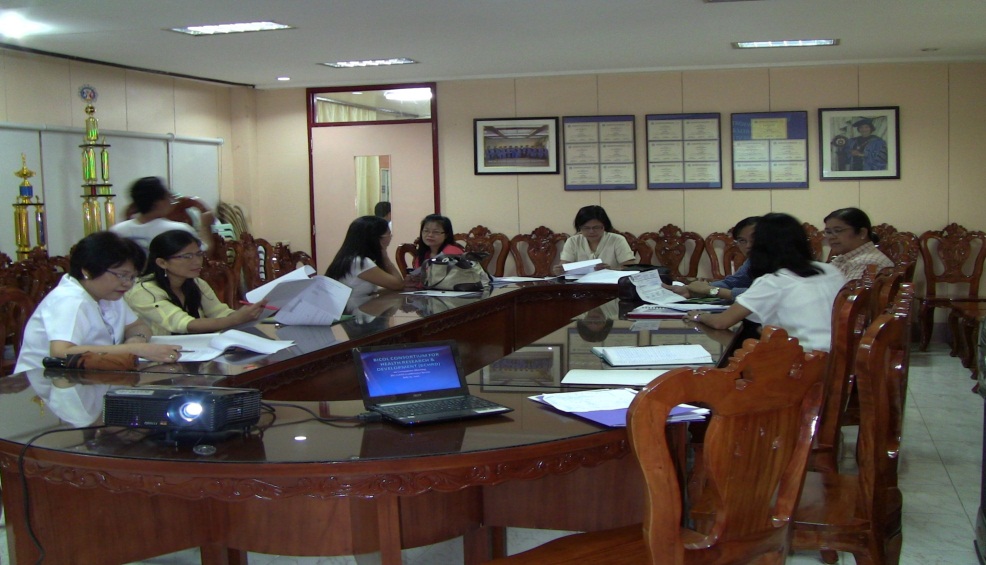
The consortium have four committees, the respective chairpersons were elected during the 1st Committee Meeting








